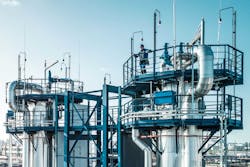Gazprom Neft lets contract for new unit at Moscow refinery
PJSC Gazprom Neft subsidiary JSC Gazpromneft-MNPZ has let a preliminary contract to Técnicas Reunidas SA to provide engineering, procurement (EP) as well as project management services on construction of a grassroots delayed coking unit to be built as part of a new deep refining complex planned under the operator’s ongoing modernization and upgrade of its 12-million tonne/year Moscow refinery (OGJ Online, May 5, 2017).
Técnicas Reunidas will carry out EP and oversee equipment deliveries, construction, and commissioning activities for a new 2.4-million tpy delayed coker designed to process residual oil into high-quality clean fuels, the service provider and Gazprom Neft said.
Valued at $240 million, the contract will run a total of 40 months for a scheduled project completion in 2025, according to Técnicas Reunidas.
The new delayed coker forms part of Gazpromneft-MNPZ’s construction of a deep refining complex that also will include a new hydrocracking plant on which DL E&C Co. Ltd. of South Korea and its subsidiary Daelim RUS LLC will deliver EP services (OGJ Online, Mar. 12, 2021).
While Gazpromneft-MNPZ has yet to reveal additional details regarding the planned deep refining complex, the project presumably comes as part of a third phase of the refinery’s modernization program that will focus on further improving environmental performance and deepening refining capabilities at the site.
Initiated in 2011 and scheduled for completion in 2025 at a final estimated cost of 350 billion rubles, the Moscow refinery’s modernization program has included various initiatives allowing the refinery to reduce its premodernization environmental impacts by 50%, with anticipation of another 50% reduction in impacts to occur once all Phase 2 works are completed in 2021 (OGJ Online, Mar. 27, 2020).
About the Author
Robert Brelsford
Downstream Editor
Robert Brelsford joined Oil & Gas Journal in October 2013 as downstream technology editor after 8 years as a crude oil price and news reporter on spot crude transactions at the US Gulf Coast, West Coast, Canadian, and Latin American markets. He holds a BA (2000) in English from Rice University and an MS (2003) in education and social policy from Northwestern University.

